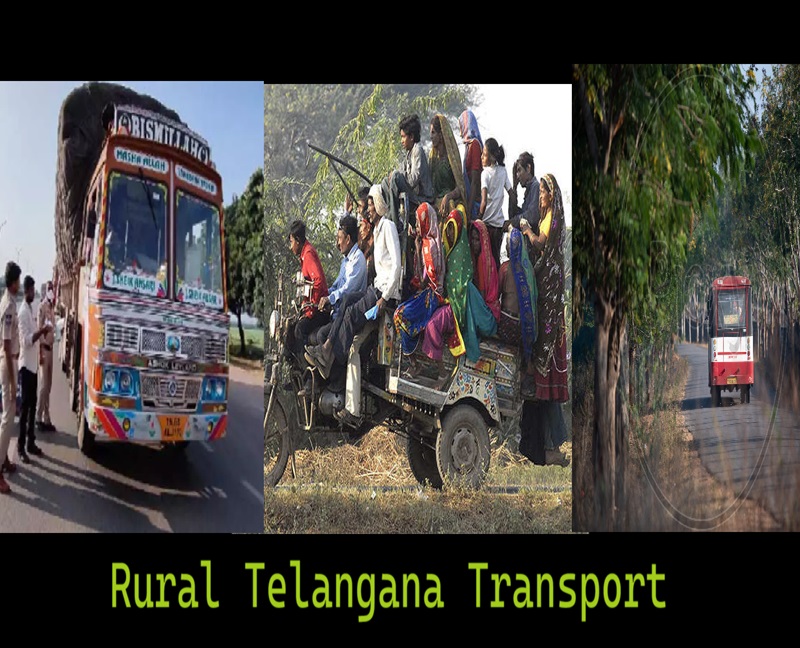In the sprawling landscapes of rural Telangana, where the earth meets the sky in an endless expanse of green, transportation struggles have long been a reality for residents navigating the vast distances between villages and towns.
As someone intimately familiar with the challenges of rural commuting, I delve into the complexities of transportation in rural Telangana, exploring the hurdles faced by communities and the innovative solutions that are bridging the gap.
Personal Perspective: A Journey Through Rural Commuting
Growing up in a remote village nestled amidst the rolling hills of Telangana, I’ve experienced firsthand the challenges of transportation in rural areas. With limited access to public transport and inadequate road infrastructure, commuting between villages and towns often involves long and arduous journeys, fraught with uncertainty and discomfort. As a student, I recall waking up before dawn to catch a crowded bus to school, enduring hours of travel on bumpy roads and overcrowded vehicles. These experiences have shaped my understanding of the transportation struggles faced by rural communities and fueled my passion for advocating for improved infrastructure and services.
Challenges Faced by Rural Commuters:
For residents of rural Telangana, accessing transportation services is often a daunting task, characterized by limited options and unreliable connectivity. Remote villages are underserved by public transport, with irregular bus services and insufficient routes leaving many communities isolated and dependent on expensive private vehicles or informal modes of transportation. Moreover, poor road conditions and lack of infrastructure, including bridges and culverts, further compound the challenges faced by commuters, particularly during the monsoon season when flooding and landslides disrupt travel.
Impact on Daily Life:
The transportation struggles in rural Telangana have far-reaching implications for residents, affecting access to essential services such as healthcare, education, and employment. For students, long and unpredictable commutes to school can result in fatigue, absenteeism, and academic underachievement. Similarly, patients seeking medical care often face delays and difficulties in reaching healthcare facilities, leading to exacerbated health conditions and reduced treatment outcomes. Additionally, limited transportation options hinder economic opportunities for rural residents, limiting their ability to access markets, employment opportunities, and other resources.
Innovative Solutions: Navigating Transportation Challenges
Despite the formidable challenges, innovative solutions are emerging to address the transportation struggles faced by rural communities in Telangana. One such initiative is the introduction of community-based transportation services, such as shared taxis and auto-rickshaws, which provide flexible and affordable options for commuters traveling between villages and towns. These services, often operated by local entrepreneurs or self-help groups, fill the gaps left by traditional public transport systems, offering door-to-door connectivity and tailored solutions to meet the needs of rural residents.
Furthermore, advancements in technology are transforming rural transportation, with initiatives such as ride-sharing apps and online booking platforms providing commuters with access to on-demand transportation services. By leveraging digital technology and mobile connectivity, these platforms facilitate efficient and convenient travel arrangements, empowering rural residents to overcome geographical barriers and access transportation services with ease.
Government Initiatives: Investing in Rural Connectivity
Recognizing the importance of transportation infrastructure in rural development, the Telangana government has prioritized investments in road connectivity and transportation systems across the state. Through initiatives such as the Gram Sadak Yojana and the Pradhan Mantri Gramin Sadak Yojana, the government is working to improve road connectivity in rural areas, constructing new roads, bridges, and culverts to enhance accessibility and mobility for residents.
Additionally, the Telangana State Road Transport Corporation (TSRTC) is expanding its bus services to rural areas, adding new routes and increasing frequency to improve connectivity between villages and towns. Moreover, the government is exploring innovative solutions such as electric vehicles and eco-friendly transport options to reduce carbon emissions and promote sustainable transportation practices in rural Telangana.
Looking Ahead: A Vision for Rural Connectivity
As we look to the future, the transportation struggles in rural Telangana serve as a call to action for policymakers, community leaders, and stakeholders to prioritize investments in rural connectivity and mobility. By leveraging innovative solutions, community participation, and government support, we can bridge the gap and ensure that all residents have access to safe, reliable, and affordable transportation services. As a resident of rural Telangana, I remain hopeful that these efforts will transform the commuting realities of our communities, opening up new opportunities and pathways for prosperity and development.#hydkhabar


[…] Personal Perspective: A Journey Through Rural Commuting […]